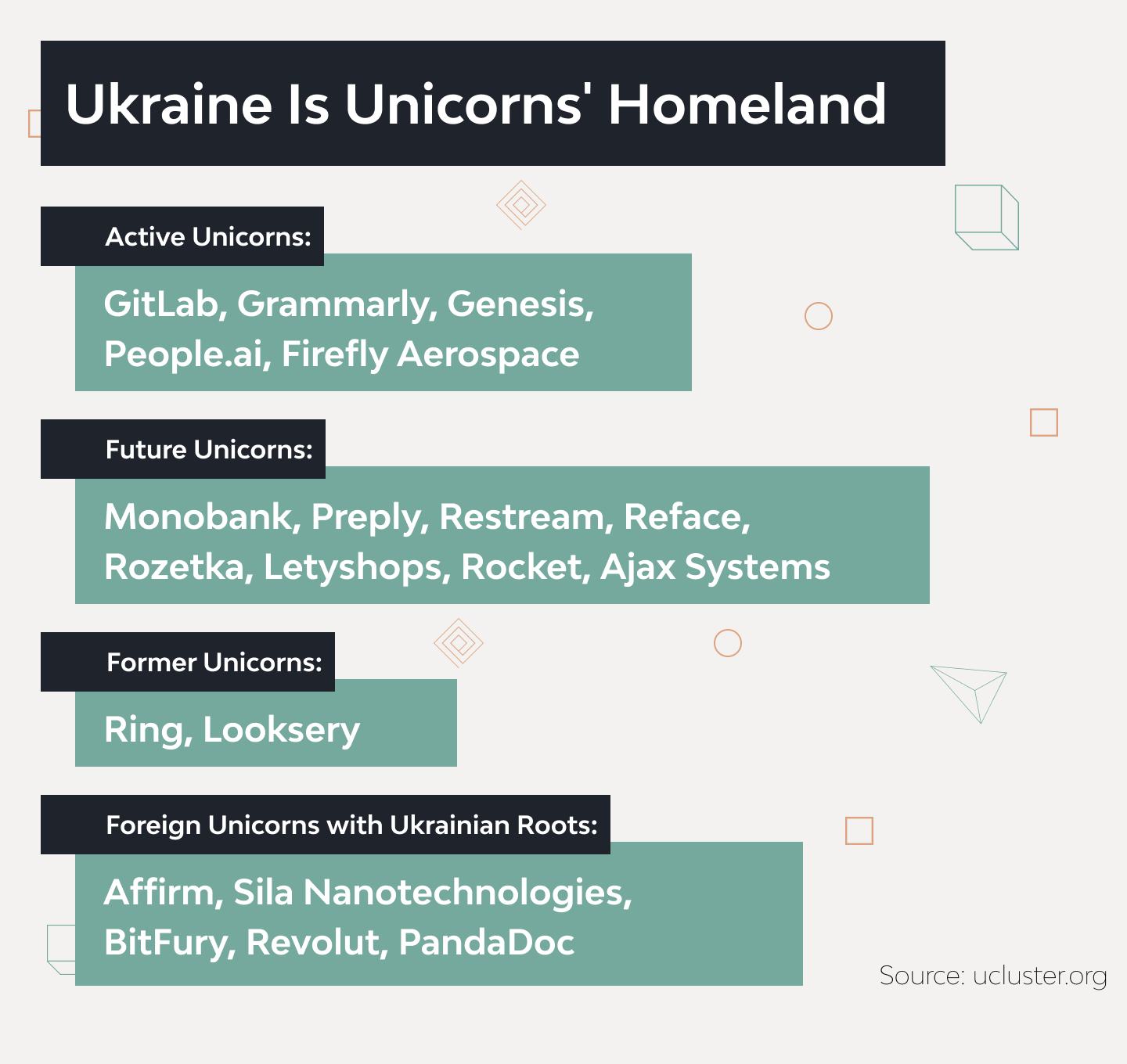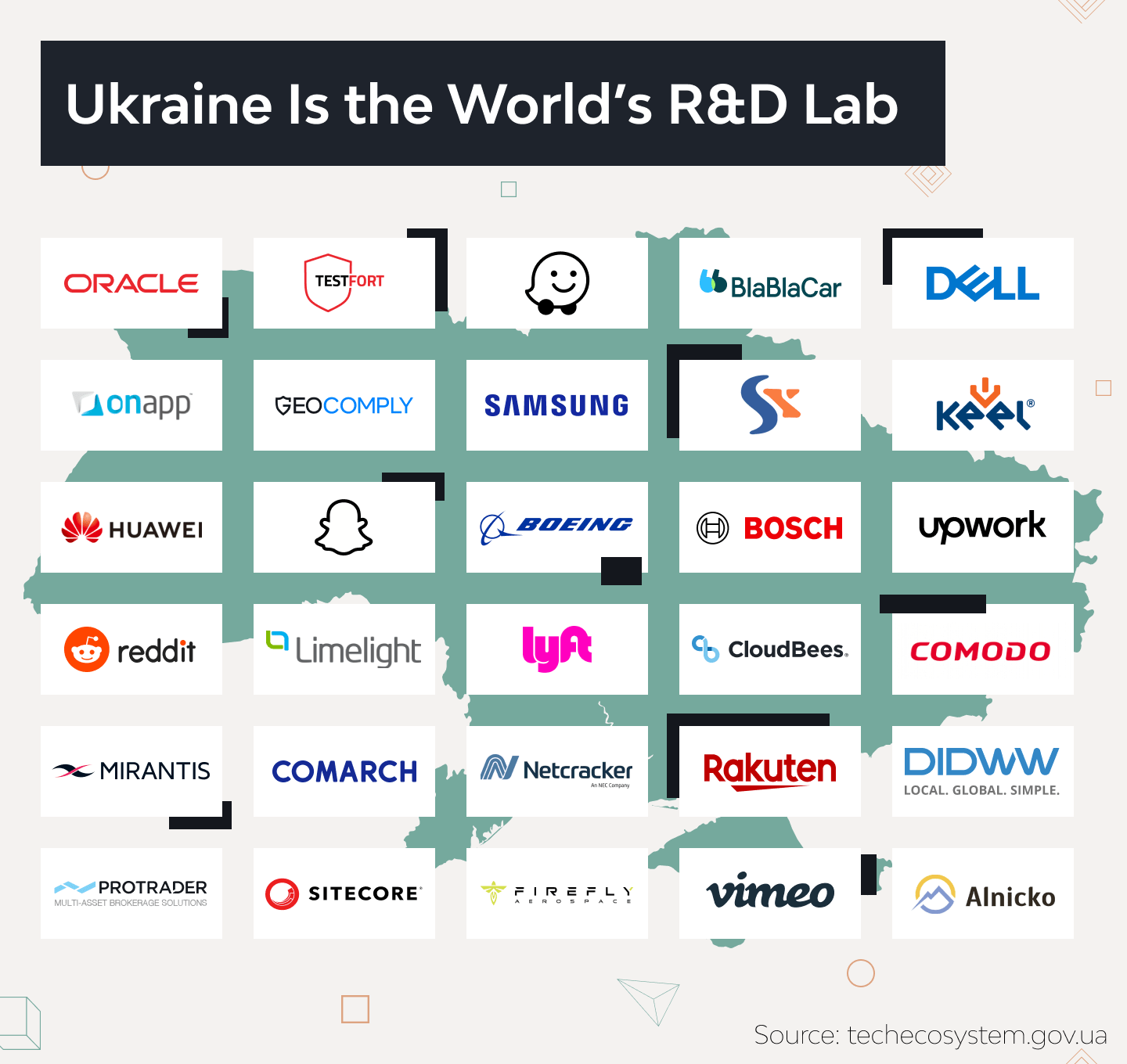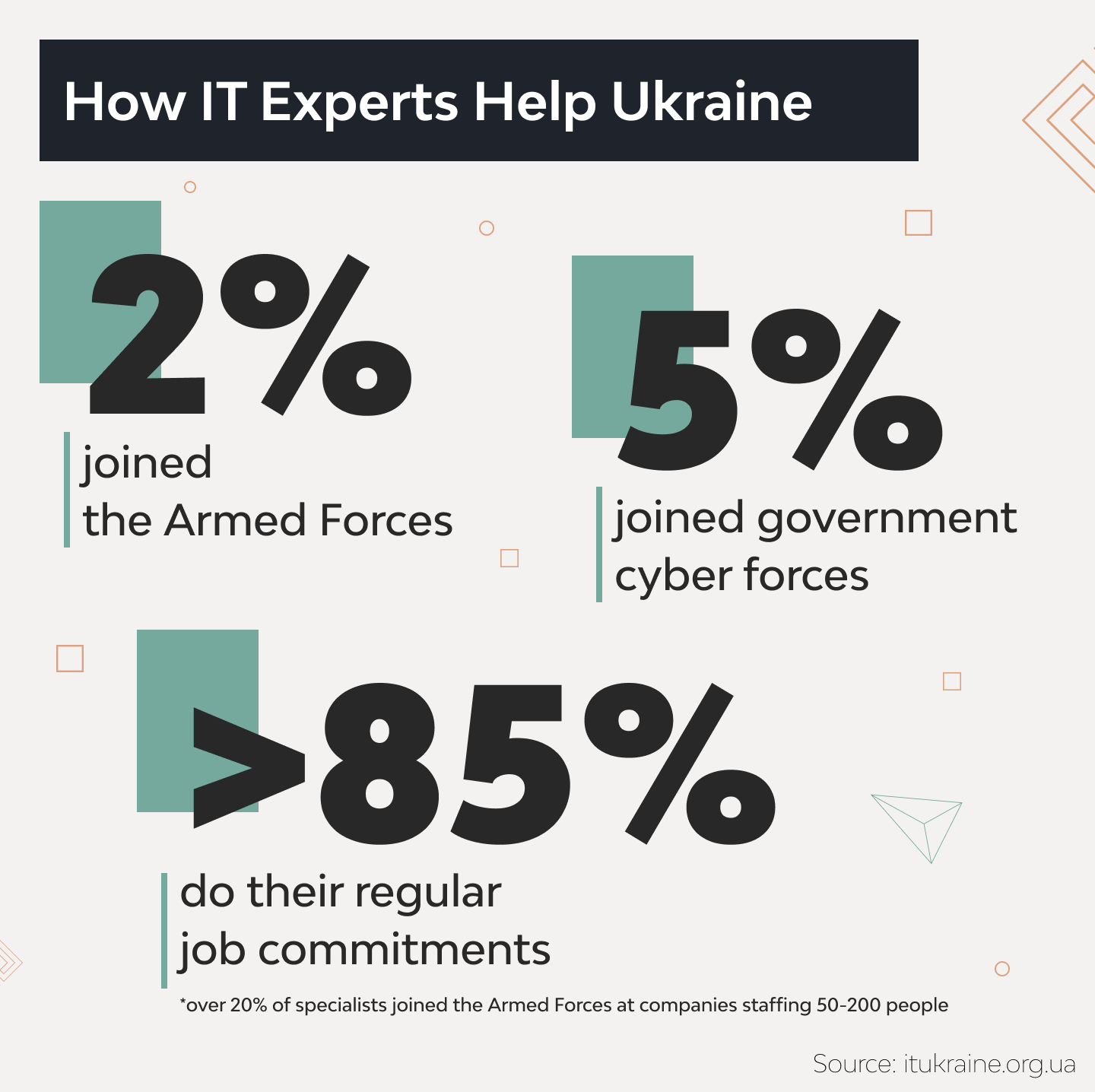IT Outsourcing in Ukraine During the War: What You Should Know

“Hi Roman! What changes should we make in communication with partners in wartime?” I’m the CEO of a software company in Ukraine, so it’s easy to imagine what was behind this and similar questions from the PM after February 24th. Of course, our partners have not expressed their growing concerns about the war directly. But when big investments are at stake, everyone wants to be reassured about their project’s stability. No one wants to chain-smoke while listening to reports from a dev team based in a hotspot.
In other words, we can’t ignore the armed elephant in the room. Our clients are worried about outsourcing in Ukraine during the war. They aren’t sure whether the vendor will be able to deliver, the team members will be mobilized, a missile won’t hit the developer’s office, or you name it. And since it’s obvious that Russia’s full-scale invasion has increased risks sharply, we should shed some light also on the measures we’re taking to protect our business and our customers’ projects.
To start, let’s be clear: the Ukrainian tech sector has become more cohesive than ever. It would be a mistake to lose sight of its possibilities and prospects, even considering the understandable concerns of working with Ukrainian IT during the war.
Ukrainian Tech Scene Overview
According to the IT Ukraine Association, before the 2022 Russian invasion, the Ukrainian tech industry had grown to USD 6.8 billion in exports. Our IT outsourcing and outstaffing providers collaborate with more than 100 clients from the Fortune 500 and a number of other large companies.
The next direction is evolving product companies and startups that have also become quite big and are occupying a significant share of the Ukrainian tech sector. Some of these companies have become unicorns (that is, well-known all over the world). Take, for instance, Grammarly (which is actually decacorn) and GitLab (which also jumped over its $10 billion IPO on Nasdaq).
In addition, some Ukrainian startups have been bought by Google, Snapchat, BlaBlaCar, and others. (According to PitchBook, some 126 startups have raised VC funding since the beginning of last year and have a primary or secondary office in Ukraine.) Our innovation is being recognized by the global giants.
Moreover, tech leaders from all over the world have opened R&D centers here.
These facts prove the high level of the service Ukrainian tech specialists provide internationally (especially considering their decent pricing).
Take our company, Django Stars. It’s grown by 150% in the previous two years and now employs 100+ skilled pros. We’re involved in development projects around the world in sectors including fintech, travel, and edtech. Although the 450 mln in funding raised by our clients may not seem much on a national scale, we consider ourselves to be a part of the Ukrainian tech community. And the contribution of each participant matters.
Why Bother?
As the above shows, Ukraine is distinguished by a large and promising IT community with strong traditions, qualified personnel, and a favorable environment for innovation. Thus, I can offer several reasons why you should stand with Ukraine in these difficult times:
- The Ukrainian tech sector has shown resilience whilst other sectors (particularly retail or manufacturing) were more seriously affected. The IT sector in this situation has become the big hope for the Ukrainian economy. In fact, it’s probably the one industry in the country that’s continuing to work in nearly the same range as before the war. And this factor is helping to curb the further spread of aggression in Europe.
- Around 240 000 tech pros are currently working in the Ukrainian IT sector. In her interview with 11:FS Spotlight, Nataly Veremeeva, Director of TechUkraine, mentioned the pre-war plans to increase that number to 450 000 by 2025. (Ukraine has 181 universities that can prepare tech specialists.)
Given the high demand and large number of vacancies worldwide, it’s difficult to find technical talent that offers similar quality, price, and level of integration into clients’ projects. If many Ukrainians migrate to Western Europe due to the war, their cost of living will gradually increase and create additional costs on wages. - As for the recovery process that will begin after the war, experts agree that it will be promising. Some even predict something like a “technical paradise”. Positive expectations in this sense are inspired by both the financial support from the governments of different countries and the people’s enthusiasm. It’s going to be a big economic surge that presents many new business opportunities. With a working economy, the country will be able to recover faster. And strong partnerships can be established already now.
How the War Has Affected the Tech Industry
Returning to the fears of working with Ukrainian IT companies during the war that clients may have, I’d like to highlight several points.
1. Project and Data Security
With respect to the reaction of Ukrainian IT to the Russian military invasion, it’s worth taking into account some preconditions:
- First, the war didn’t start in 2022 but in 2014. But since the Russian occupational forces were localized in the south and east of Ukraine, companies had time to think about their business continuity strategies and prepare for various scenarios.
- Then, ironically, the pandemic, with its lockdowns, remote working, and shift to digitalization has also contributed to greater flexibility in processes.
- There were long months of threats from the aggressor and “military exercises” that pulled Russian troops to the border.
Thus, we had the opportunity to prepare and not lose data on current projects.
2. Working Conditions for Teams
In February, some Ukrainian software companies heeded the warnings of foreign intelligence agencies and began to take their employees out of dangerous regions in advance. Other companies were forced to carry out their relocations in the first days of the invasion.
In total, about 16% of Ukrainian IT specialists went abroad after February 24, according to estimates from the IT Ukraine Association. Nearly 70% of these specialists moved to safer regions in the western part of the country.
Thus, although the need to support their families and country motivates people to continue working even in bomb shelters, if necessary, development processes have long been worked out and are quite stable.
Today, during the war, most Ukrainian development companies continue to deliver steadily and have recovered about 90% of their volume of operations. For example, Django Stars has restored 93,94% of its pre-war capacity as I write these lines. It should be also noted that the Ukrainian banking system played an important role by honorably withstanding the blow of the war.
3. Safety of Key Employees
The question of military mobilization may be a concern, especially in relation to men. But the technical community does much to maintain predictable rules of the game in this area.
The association currently is working with the Minister of Digital Transformation to make sure that the key personnel can be really booked, and we already have this legislation.
— Nataly Veremeeva, Director of TechUkraine
In terms of the country’s defenses, there are several front lines, including physical and economic forces. Working projects need people to ensure that they keep paying taxes to support the economy.
In addition, the Ukrainian army is dealing with a long line of volunteers who are ready to defend their country. Priority is given to those with relevant training and experience. IT professionals are not the first ones to be mobilized. Besides, they can be more effective by doing what they’re good at. For example, there’s also an information front involving so-called cyber forces. This is an initiative of the people, many of them volunteers, who are actively fighting against the spread of Russian propaganda.
Because clients aren’t dealing with individuals but with tight-knit teams, it’s possible to use task prioritization and teammates’ help. I won’t speak for other companies, but at Django Stars we never stopped hiring — among other things, to watch the backs of our mobilized employees.
Join Forces To Weather the Storm
The Ukrainian IT outsourcing companies during the Russian invasion respect their commitments and are doing everything possible to protect their clients’ interests in these unprecedented circumstances. However, this doesn’t mean there are no difficulties. Today, any help from abroad is highly welcome. What can such help consist of?
- Keep going (or don’t hesitate to start) ordering development in Ukraine. For many IT specialists who are located in the safe cities of Ukraine, work has become a way to stay sane. At the same time, they didn’t become less competent. On the contrary, they’re often more motivated, perceiving support for the economy as a personal challenge.
- Buy licenses for Ukrainian products and services. If you’re already using them, just keep doing it. If you’re considering alternatives, take a closer look at solutions from Ukrainian developers. It’s usually worth it.
- Abandon Russian services. The point here is not antipathy but a need to stop injecting money into the aggressor country. The sooner the Russian war machine stops, the more lives will be saved.
- The greatest caution, as expected, regards the signing of new contracts. Therefore, we would be grateful to everyone who has already worked with Ukrainian companies and can spread positive feedback and recommendations. As it’s a significant factor in decision-making and cooperation.
- Verify the sources before sharing information, and help fight Russian propaganda. Today, on the Russian side, there’s a kind of reluctance to wake up from hypnosis. But sooner or later, they should understand the inadmissibility of such an archaic war in the center of Europe in the 21st century.
Let’s Summarize
The wartime outsourcing risks of working with Ukraine are offset by the country’s strong and developed tech sector, pre-established processes (including online collaboration tools and contingency plans), and effective team support (including moving people to safer regions and additional hiring).
If you support Ukraine, your business can benefit from keeping our country’s tech sector afloat. To do it, consider signing contracts with UA, purchasing Ukrainian licenses, sharing recommendations, stopping propaganda, and cutting off financing to the aggressor.
These measures are what Ukraine needs. Weapons are needed as well, but that’s clearly beyond the scope of an IT article. However, if you want to donate to our army and volunteer organizations, please follow this link for guidance and payment details.










